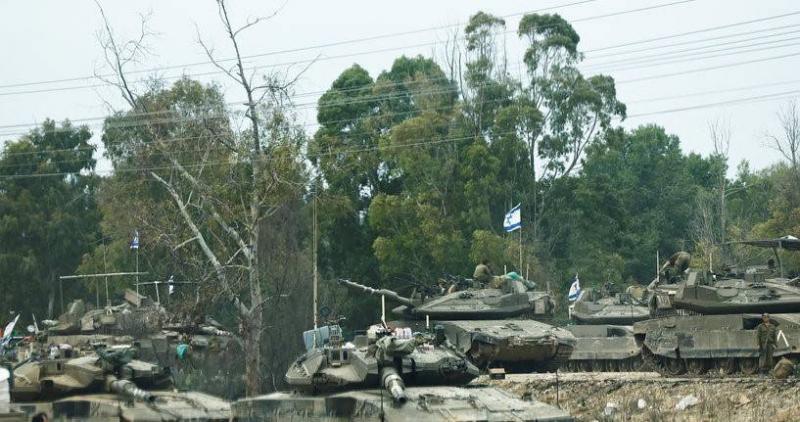Israel is preparing to evacuate over one million Palestinians from the city of Rafah to initiate a ground assault against the Islamic Resistance Movement (Hamas) in the southern Gaza Strip. These Palestinians are living in dire conditions after being displaced from the north due to Israeli bombardment. Relief agencies have warned that a military attack in such a densely populated area could ultimately result in a significant number of civilian casualties. The United Nations Relief and Works Agency for Palestine Refugees in the Near East (UNRWA) stated that it does not know how long "such a high-risk operation" might take.
UNRWA Commissioner-General Philippe Lazzarini said, "There is a growing sense of concern and panic in Rafah, as people have no idea at all where to go." The office of Prime Minister Benjamin Netanyahu announced yesterday that the army has been asked to devise a plan for "evacuating the population and destroying" four Hamas brigades said to be located in Rafah. The statement added that Israel would not be able to achieve its goal of eliminating Hamas militants as long as those units remain.
No further details were provided in the statement. This announcement comes two days after Netanyahu rejected Hamas's proposal for a ceasefire, which included the release of hostages held by the group. The United States, a key supporter of Israel, stated that it would not endorse any military operation that does not protect civilians and shared a new national security memo reminding countries receiving U.S. arms of their obligation to adhere to international law.
White House spokeswoman Karine Jean-Pierre told reporters, "There are no new standards in this memo. We are not imposing new criteria for military assistance." She added, "They (the Israelis) have confirmed their readiness to provide such guarantees." Over one million people, displaced southward after four months of Israeli bombardment, are concentrated in Rafah and its surrounding areas near the coastal enclave's border with Egypt, which has tightened security procedures out of concern for a mass exodus.
Doctors and relief workers are facing great difficulties in providing basic aid to Palestinians sheltering near Rafah. Many are trapped at the border fence with Egypt, living in temporary tents.
Israeli forces have shifted their attacks southwards towards Rafah after initially invading northern Gaza in response to an attack carried out by Hamas militants on October 7. The United Nations stated today that civilians in Rafah must be protected, but there should be no forcible mass displacement, which it described as contrary to international law.
Jan Egeland, Secretary-General of the Norwegian Refugee Council, cautioned that "no war can be permitted in a massive refugee camp," warning of a "bloodbath" if Israeli operations extend there. The Palestinian presidency stated that Netanyahu's plans for military escalation in Rafah are aimed at forcibly displacing the Palestinian people from their land. Mahmoud Abbas's office, head of the Palestinian Authority, declared that "the occupation's undertaking of this step threatens security and peace in the region and the world, and it crosses all red lines."
An Israeli official, speaking on condition of anonymity, stated that Israel will attempt to organize the transfer of the displaced in Rafah to the north from where they previously fled before any military operations there. The Gaza Health Ministry confirmed that at least 27,947 Palestinians have been killed since the war began, with another 67,459 injured.
All were killed after Netanyahu's statement. Israel carried out an airstrike on a house in Rafah, resulting in the deaths of at least 11 Palestinians, according to reports from Hamas-affiliated media. Reuters could not independently verify these accounts. Palestinian health officials reported that earlier Israeli airstrikes killed at least 15 people, eight of them in the Rafah area.
Mohamed Al-Nahal, an elderly Palestinian standing by the rubble of a targeted building, said, "We were sleeping when it hit us, we ran outside, then another missile struck, destroying the entire house with our money." He added, "My daughter, her husband, and their son were all martyred; only two of us remain in the hospital."
The Israeli army stated that its forces are conducting operations in Khan Younis, northern, and central Gaza to eliminate militant cells and destroy their infrastructure. Israel claims it is taking measures to avoid civilian casualties and accuses Hamas militants of mingling with civilians, including in schools being used as shelters and hospitals. Hamas has denied these accusations.
Hamas proposed a ceasefire lasting four and a half months during which all remaining hostages would be released, Israeli forces would withdraw, and an agreement to end the war would be reached. This offer was Hamas's response to a proposal drafted last week by the heads of U.S. and Israeli intelligence and communicated to the group by Egypt and Qatar. Netanyahu rejected Hamas's terms, labeling them as "misleading" and pledged to continue fighting.




